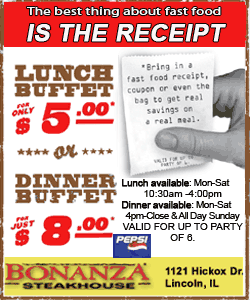 The request is being made by a wind farm that is planning to erect
29 wind-generating towers in northern Logan County. The area begins
near Union and stretches northwestward toward Delavan. Heather
Harper was present representing Rail Splitter Wind Farm. Horizon Wind
Energy is serving as the developer. The request is being made by a wind farm that is planning to erect
29 wind-generating towers in northern Logan County. The area begins
near Union and stretches northwestward toward Delavan. Heather
Harper was present representing Rail Splitter Wind Farm. Horizon Wind
Energy is serving as the developer.
The wind farm extends into Tazewell County, but enterprise zone
and other regulating decisions for that part of the farm are being
made by Tazewell County authorities.
Aldermen were notified on April 11 that documents detailing the
request were available for their review and were told that it would
be discussed on April 15. Several of the newer aldermen on council
have not been through an enterprise zone request and indicated that
they felt uncomfortable discussing it on such short notice. Alderman
Melody Anderson said that she needed a better understanding of the
enterprise zone and how the amendment would affect the city.
City attorney Bill Bates and Lincoln and Logan County Regional
Planning and Zoning Commission director Phil Mahler summarized the
history and purpose of the Lincoln/Logan County Enterprise Zone.

The enterprise zone is a state-run program that was created to
help communities attract new businesses and industry. It offers
property and sales tax incentives. Site approval is based on
statistical economic need criteria.
Lincoln and Logan County established the local program in 1987.
It was extended last year to run for another 10-year period, until
June 30, 2017.
Bates said that the Rail Splitter Wind Farm request is only for
the sales tax exemption. They are not asking for property tax
abatement.
Harper explained that the sales tax exemption would assist
Rail Splitter on any construction materials purchases made in the
state of Illinois. This would have little or no effect locally, as
few of their construction materials to build the turbines could be
purchased locally.
Mahler spoke in favor of extending the enterprise zone to the
wind farm. Rather than offering the limited territory to small
businesses, he said the enterprise zone should be used to attract
larger businesses. "We ought to be thinking on a grander scale," he
said. These towers, which will be valued at $2 million when
completed, have $1 million in construction materials.

A 3-foot-wide zone extending along Interstate 155 would create
contiguous property extension from the current enterprise zone and
branch out to each tower parcel. The amendment expands the zone from
12 square miles to 15 square miles, leaving 8 square miles still
available, Mahler said.
The Lincoln/Logan County Enterprise Zone was extended to Sangamon
County for the Formosa plant in 2005. It was extended through
Elkhart, and a potential construction site was added there as well
at that time.
Lincoln and Logan County must approve amendments to the
enterprise zone, and by state regulation the village of Elkhart and
Sangamon County must also sign off on any amendments. Once the
approvals are completed, Mahler will submit the paperwork to the
state of Illinois for final approval.
When Formosa joined the enterprise zone they offered the city and
the county $5,000 each, every year, to help with the administrative
costs of the program. Mayor Beth Davis-Kavelman asked Harper if
Rail Splitter might make a monetary compensation also. It would be a
small concession for the possible savings Rail Splitter could
realize.
[to top of second column] |

Wastewater treatment plant manager Dave Kitzmiller observed that the
towers would be generating energy, and energy costs are a big
concern to the city. He questioned if there could be some sort of
means of acquiring their energy at a reduced rate.
Bates said he could not approve the agreement as it was
presented. It appears that there are numerous affiliates to the
project and only Rail Splitter was named. He was concerned that this
could become a nonbinding contract.
Harper said that Rail Splitter is the builder for the towers and
is the entity signing all documents.
Harper agreed to work on getting the agreement in a condition
acceptable to Bates for the city to sign, and to look into possible
compensation offerings.
The matter was set to put on next week's agenda to vote on, with
the understanding that next week's meeting is already planned to be
adjourned to the following week in order to pay end-of-year bills
and then approve the fiscal year budget. The enterprise zone
agreement could be carried over to the April 29 meeting if it is not
ready for completion next week.
The Logan County Board was concurrently in session across the
street while the city discussed the matter. It was the board's
once-a-month voting meeting. During that meeting board members
agreed, with 11 voting yes and one voting present, to extend the
enterprise zone to the Rail Splitter sites. The one abstaining vote
came from Chuck Ruben, who owns property that would have a turbine
built on it.
The county would benefit from builder permit fees and property
taxes. The county would realize nearly a quarter-million dollars
upfront from building permit fees that have been set at $7,780 per
tower.

Property taxes would increase over the current land values that
are now assessed as farmland. Towers would be assessed by the power
they produce. That rate has been set at $9,000 per megawatt hour.
Each of the towers planned to go in this field would be capable of
producing up to 1.5 megawatts. That would be an estimated high
potential of $13,500 for each of the 29 towers. Trending factors
would be applied, as well as the Consumer Price Index, the
township's multiplier and a 25-year depreciation schedule, all of
which add and subtract from that figure and vary each year.
[By JAN YOUNGQUIST]
For more information see
"Lincoln/Logan County Enterprise Zone: Incentives for Capital
Improvements."
Past related articles

 |